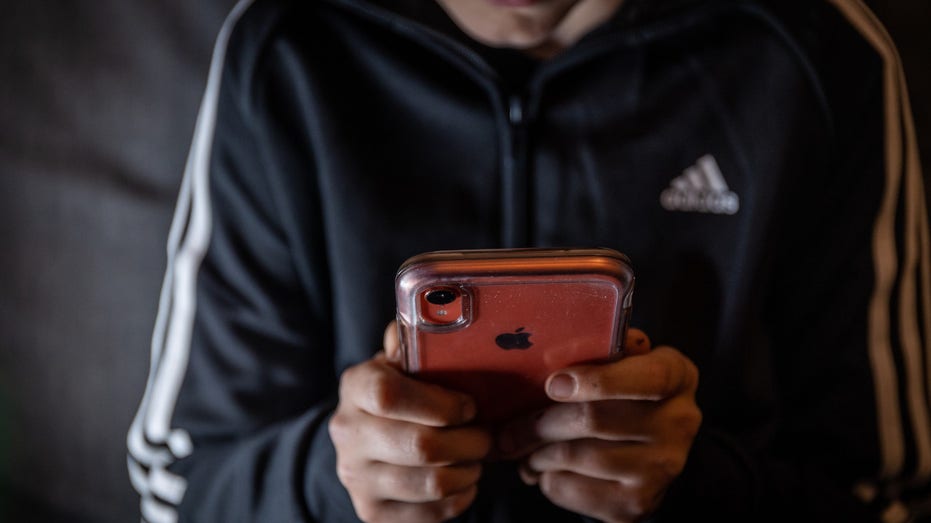
Web3 consultant and AI expert Joseph Raczynski discusses with Fox News Digital the ‘skepticism’ Snapchat users should have when using its new artificial intelligence feature.
This story discusses suicide. If you or someone you know is having thoughts of suicide, please contact the Suicide & Crisis Lifeline at 988 or 1-800-273-TALK (8255).
About two out of every three teenagers are targeted by “sextortion” schemes, according to new research conducted by Snap Inc., which owns the social media app Snapchat.
Sextortion is a “serious crime,” according to the FBI, by which perpetrators exchange or receive nude photos from victims over the internet then use the victim’s photos to extort them for money or more nude photos.
Sextortionists disproportionately target young men for money on social media apps, including Snapchat, Instagram, Tumblr, Twitter, Facebook and others, though girls are also targets for explicit images and photos.
“For young males who have experienced a sextortion incident — and the majority are males — they regularly tell us that when they share the situation with their parents, they feel relieved. We advise them to report to hotlines and helplines, to report to the platforms and to tell their parents, a friend or a trusted adult. They should not be going through this alone,” Arda Gerkens, president of Offlimits, the Dutch child abuse hotline formerly known as EOKM, said.
GROWING SNAPCHAT ‘SEXTORTION’ SCHEMES TARGET YOUNG BOYS, EXPERT WARNS

Sextortionists mostly target young men for money on social media apps, including Snapchat, Instagram, Tumblr, Twitter, Facebook and others. (Matt Cardy/Getty Images / Getty Images)
In total, 65% of teens on Snapchat and other apps said they or their friends were targets of sextortion in which they were either “catfished” — tricked into speaking with people lying about their identity online — or hacked for private information, including explicit photos, that were then used against them.
| Ticker | Security | Last | Change | Change % |
|---|---|---|---|---|
| SNAP | SNAP INC. | 10.82 | +0.18 | +1.69% |
| META | META PLATFORMS INC. | 288.73 | +3.85 | +1.35% |
| KKR | KKR & CO. | 53.59 | -1.59 | -2.89% |
MICHIGAN FAMILY SOUNDS ALARM ON SON’S ‘SEXTORTION’ SUICIDE AFTER ARRESTS OF 3 NIGERIAN MEN
Instances were split by catfishing and hacking. Fifty-one percent of respondents said they or their friends fell victim to catfishing, and 47% saying they were hacked.

Sixty-five percent of teens on Snapchat and other apps said they or their friends were targets of sextortion and were “catfished,” tricked into speaking with people lying about their identity online or hacked for private information. (iStock / iStock)
About one-third of teens who became targets of these scams shared explicit or private images.
Given that about 75% of American teens use Snapchat, including 86% of Black teens and 71% of White teens, according to a survey of 760 U.S. teens by the AP-NORC Center, the number of teenagers potentially being targeted by sextortion schemes could be in the tens of millions.
SOUTH CAROLINA LAWMAKER EXPOSES DANGERS OF ‘SEXTORTION’ AFTER TEENAGE SON’S SUICIDE
A former Snapchat employee previously told Fox News Digital “almost 100%” of sextortionist attempts come “from Nigerian users,” and the victims are “always young men.”

About 75% of American teens use Snapchat, including 86% of Black teens and 71% of White teens, according to a survey of 760 U.S. teens by the AP-NORC Center. (Matt Cardy/Getty Images / Getty Images)
“They’re targeting young men because young men are the most likely to fall for this type of scheme,” the former employee explained. “Also, young men are not used to … being targeted like this.”
The unfortunate reality of sextortion is that some teens spiral into darkness once a sextortionist threatens to share or publicize their nude images if the victim does not hand over money or more explicit content of themselves.
FBI WARNS TEEN BOYS INCREASINGLY TARGETED IN ONLINE ‘SEXTORTION’ SCHEMES
In one example of the severe impact sextortion has on children and teens, a 17-year-old Michigan boy, Jordan DeMay, took his own life after becoming a sextortion victim via Instagram.

Three Nigerian men were arrested in the alleged sextortion of 100 young men and the 2022 suicide of 17-year-old Jordan DeMay. (Handout / Fox News)
The main suspect in his death, 22-year-old Samuel Ogoshi, is one of three men from Lagos arrested earlier this month for allegedly hacking Instagram accounts and sextorting more than 100 young men online, including DeMay. Ogoshi allegedly posed as a young woman under the username “dani.robertts.”
The account was real but had been hacked and sold to Ogoshi, who used the profile to coerce young men into sending explicit photos of themselves, authorities said. He allegedly used the photos as leverage for money, according to the FBI.
WARNING SIGNS OF SUICIDE: WHAT TO KNOW ABOUT PREVENTION, RED FLAGS AND HOW TO DEAL WITH THE ISSUE
DeMay believed he sent a nude image to Ogoshi, posing as dani.robertts, who then threatened to send the image to DeMay’s friends and family if DeMay did not send money. When DeMay could not send any more money, he shot himself.
In another example, South Carolina Republican state Rep. Brandon Guffey’s 17-year-old son also died by suicide after becoming a sextortion victim.

Gavin Guffey, 17, died by suicide after being targeted in a sextortion scheme. (Brandon Guffey)
Similarly, a perpetrator posing as a young woman reached out to Gavin Guffey on Instagram, requested nude images, then threatened to expose them if he did not send money. When Guffey could not send any more money, he also shot himself.
Most respondents — 56% — in the Snap Inc. study said they turned to friends, parents or other trusted adults after being threatened online. Half said they reported the incident to the platform they were using, 40% blocked the perpetrator and 30% said they updated their account security settings.
A Snap spokesperson previously told Fox News Digital in a statement that the “sexual exploitation of any Snapchatter, especially a teen, is horrific, illegal” and against the company’s policies.

Most respondents — 56% – in the Snap Inc. study said they turned to friends, parents or other trusted adults after being threatened online. Half said they reported the incident to the platform they were using. (Adam Berry/Redferns / Getty Images)
“Financial sextortion is a growing online threat, and we have been ramping up our tools for combating it, including strengthening our detection technologies. We are continuing to invest in new protections for both teens and parents and are developing educational resources to help raise awareness about these growing online harms,” the spokesperson said.
GET FOX BUSINESS ON THE GO BY CLICKING HERE
Snapchat now features a new reporting tool under the phrase “They leaked/are threatening to leak my nudes” in which users can alert Snapchat to possible sextortion schemes. Snapchat also has a parental supervision feature called Family Center.
In the coming weeks, Snapchat will launch a new Safety Snapshot series to educate users on the dangers of sextortion and teach them how to handle a sextortion situation.






